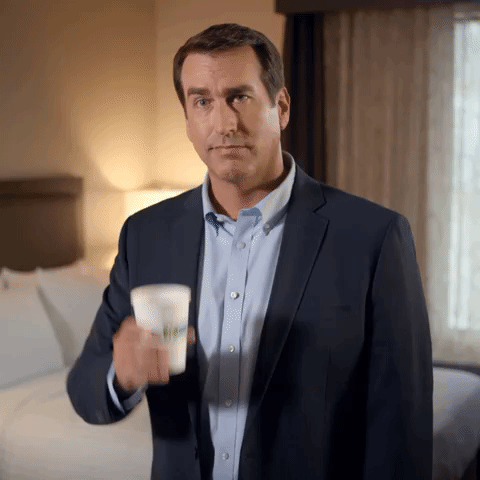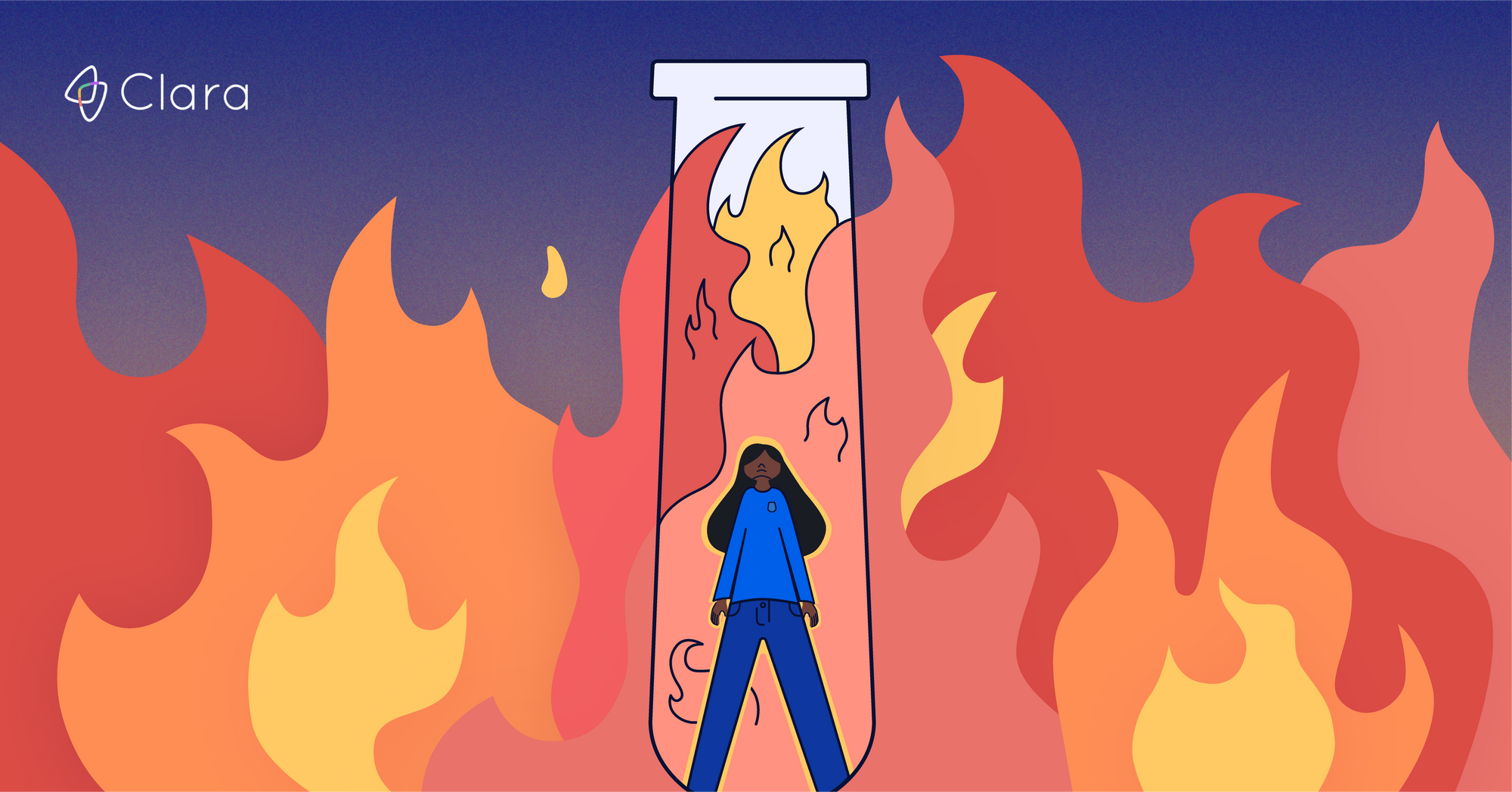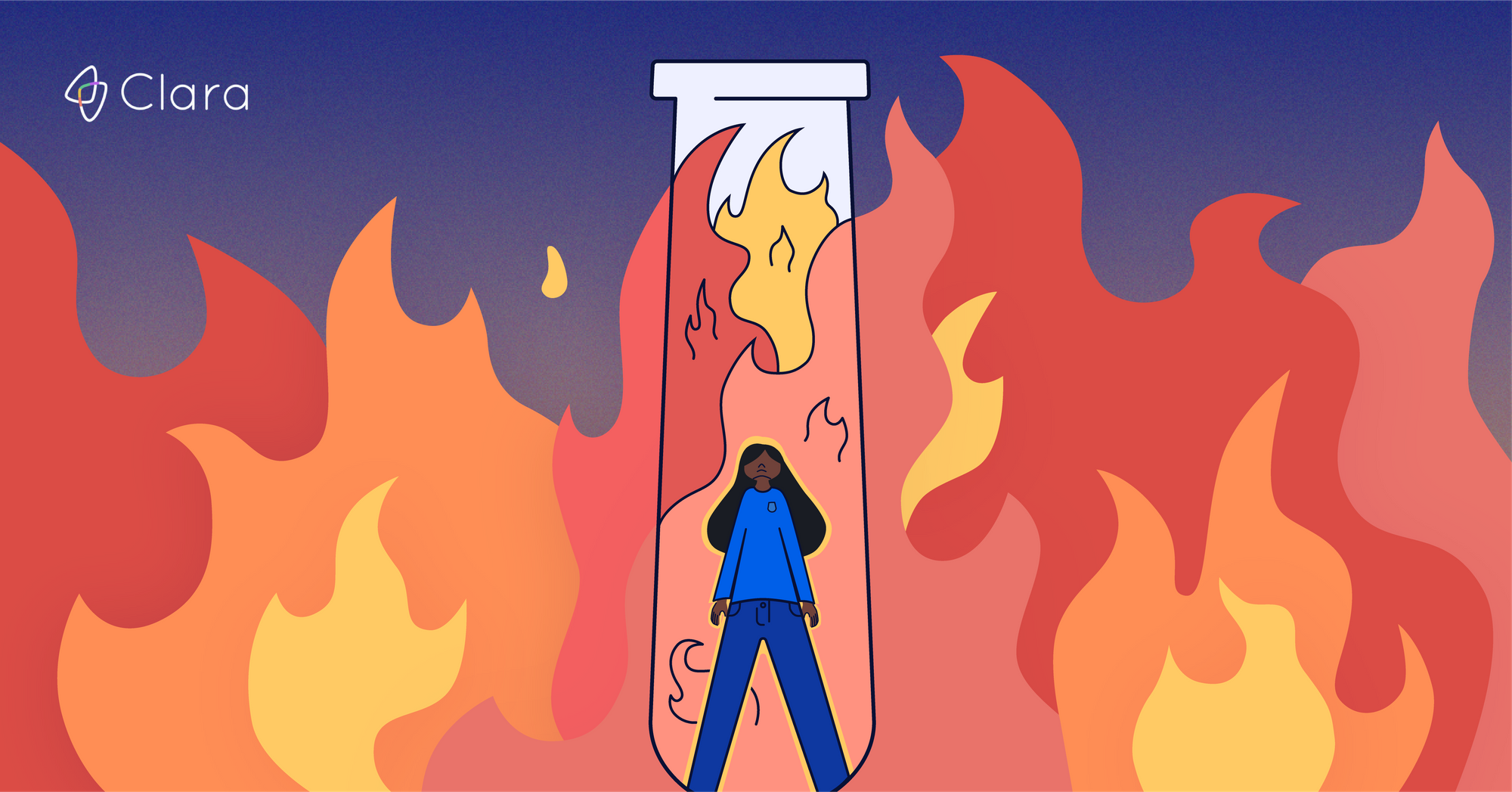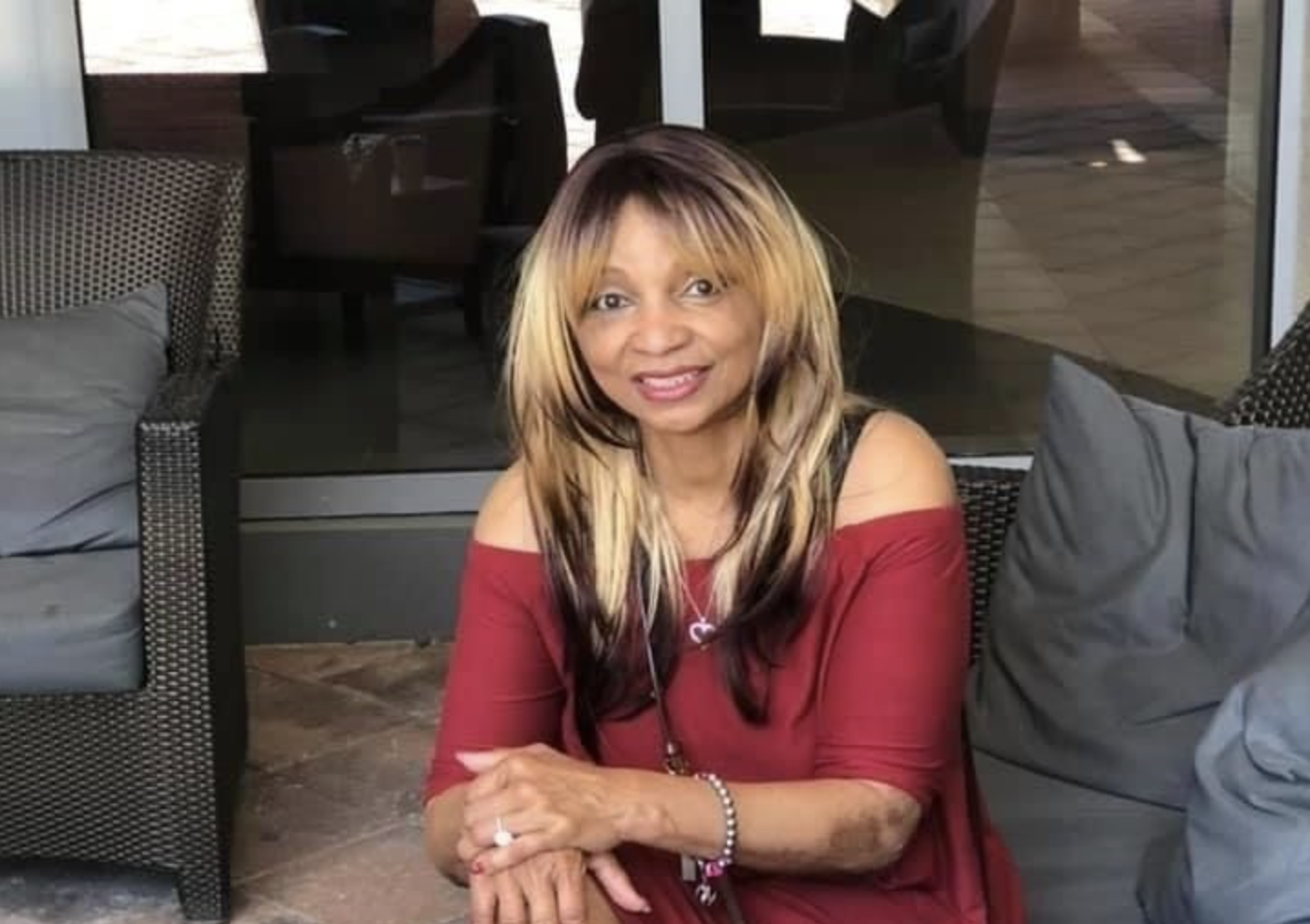Our latest Patients Have Power episode is called "I was, like...Are you kidding me?" (You can subscribe to the podcast at Apple Podcasts, watch the video, or listen to it with the media player above).
In this episode, I talk with Aaron, Clara's Head of Marketing about my keynote speech at the Interdisciplinary Autoimmune Summit, where I spoke about the administrative burdens placed on patients.
Below is a transcript of the episode for your reading pleasure!
Lilly Stairs: Hey everyone. Welcome to the Patients Have Power podcast. This is the first time we're actually filming the podcast, so that's pretty cool!
Aaron Jun: Yeah, it's pretty awesome. Welcome back to town.
Lilly Stairs: Thank you.
Aaron Jun: Cheers.
Lilly Stairs: Cheers!

Aaron Jun: Well I mean, it's five o'clock. It's literally five o'clock right now.
Lilly Stairs: Five o'clock on a Thursday so we think we deserve this. I just got back from Boston. I was at the Interdisciplinary Autoimmune Summit.
Aaron Jun: Big week.
Lilly Stairs: Big week. It was exciting because it's this conference that actually brings together gastroenterologists, dermatologists, rheumatologists, so all of these physicians who are working across treating different autoimmune diseases. And it brings them together so that dermatologists can learn about rheumatoid arthritis or Crohn's disease, and gastroenterologists can learn about psoriasis and some of these other diseases.
And so, I as a patient was so excited to see that, as a patient living with multiple chronic illnesses. Seeing these physicians taking a vested interest in learning about some of these other diseases, because they're treating these patients.
Aaron Jun: Yeah it's awesome, and for the audience at home, why were you there? Why were you back in Boston?
Lilly Stairs: Well, so, I was actually the keynote for the summit.
Aaron Jun: Big job.
Lilly Stairs: It was a big job! And so, you know what, Aaron, actually I'm gonna give him a little credit here and I'm-
Aaron Jun: A lot of credit.
Lilly Stairs: Gonna give him a shout out. Okay. A lotta credit.
Aaron Jun: Yep.
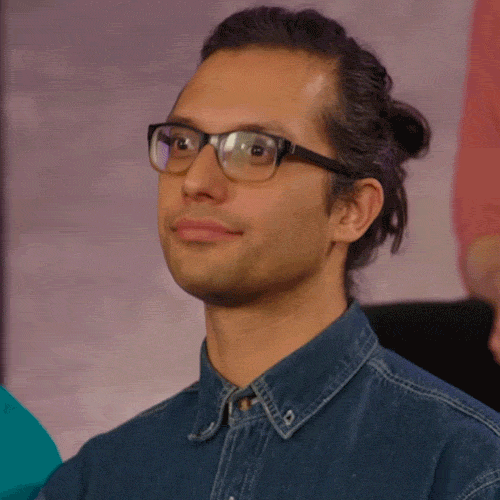
Lilly Stairs: You gave me one tip to add to this presentation. So, Aaron and I were on the phone a couple of days before I had the keynote presentation, he said, "How are you feeling about it?" And I said, "Hmm you know, alright. It's kind of a lot of pressure."
And he's like, "Why?" And I said, "Well, it's the keynote." And he said, "You need to watch Bruce Springsteen-"
Aaron Jun: At South by Southwest in 2014.
Lilly Stairs: Okay I said 2012 on stage.
Aaron Jun: Or 2012, I can't remember when it actually was.
Lilly Stairs: Alright alright, I hope I'm not misquoting.
Aaron Jun: I'm a huge Bruce Springsteen fan.
Lilly Stairs: Who isn't?
Aaron Jun: So I sent her this clip of Bruce Springsteen at South by.
And what does Bruce say?
Lilly Stairs: So, it was funny because he said - first of all, I'll preface this by saying Aaron said, "Oh yeah, so this might not necessarily help you but it will make you feel a little better. Like somebody else gets it." And I was like, "Alright."
Aaron Jun: The Boss gets it.

Lilly Stairs: The Boss gets it. The way he opens his keynote is he says, "I was unsure if I wanted to accept doing this keynote because it's a big responsibility, because I have the responsibility of really trying to capture what this whole event is about. And what's happening over the next couple of days, and embodying that."
And so, I actually used that to open my keynote in saying that I was really honored to be there. I was nervous to take this position of capturing and embodying why all these physicians were there, and why they do what they do.
Because ultimately, they're all there for patients, right? That's why many of them are in medicine, the good ones at least. And so I kind of opened with that and anyway, shout out to Aaron. He gets credit for-
Aaron Jun: Good job Aaron-
Lilly Stairs: Yes. Not the rest of the 40 minute presentation-
Aaron Jun: Right. 40 minutes, 20 minutes. Who's counting?
Aaron Jun: But we're gonna have video of that hopefully soon, and we'll put that up and we'll link to it but, I think the meat of what you were talking about while you were giving the keynote is what we wanted to talk about today.
So let's talk about it.
Lilly Stairs: Yeah yeah. So we covered a few different things. One, something that's really important to me is that - and I'll preface this with, for those of you who don't know, I spent a lot of time prepping the keynote and actually talking to many patients, including many of our Breakthrough Crew ambassadors, so shout out to all of you.
Aaron Jun: Cheers to them.
Lilly Stairs: Yes. Cheers. You're our favorites. Because I stood on stage and I said,
"It would be useless for me to share my one personal experience."
Aaron Jun: Right.
Lilly Stairs: "That's not enough. We need to be talking about all patient experiences."
And so that's what we did. So I chatted with a lot of different patients and we'll share the slides. We've shared some of them on Twitter already, but I actually took screen shots of Tweets that I received back from patients on these issues and read them word for word on stage.
So I just want other people, patients, to know that, that we are working to elevate your voice and bring it to the forefront and make sure we're fighting the good fight there.

Lilly Stairs: I talked about a few different things. So the whole idea was to be talking about "what is it like for a patient living with multiple autoimmune diseases, and what's the burden? What are the unique considerations that physicians need to be considering when they're working with these types of patients?"
And so, one of the first things I talked about was this burden beyond the illness that you're living with.
Lilly Stairs: So, some of the key frustrations that came out from patients based on the conversations we had, were these massive administrative burdens that patients are having to deal with.
Everything from the fact that they're discharged from the hospital, and now they're expected to try to go pick up pain meds, and schedule five more follow up appointments, and coordinate with their insurance...
Aaron Jun: And it's not like this is there job. 'Cause they have a job.
Lilly Stairs: They have a job.
Aaron Jun: And they have a family.
Lilly Stairs: Yep.
Aaron Jun: And they have loved ones and they have social life and all of this takes how many hours, for them? You know it's-
Lilly Stairs: Oh it's bananas-

Aaron Jun: Absolutely wild.
Lilly Stairs: It's bananas. And so we were talking about how - and I was very clear, starting this presentation. I know that physicians have an administrative burden on their shoulders.
Aaron Jun: Right.
Lilly Stairs: As well. It's like they've got ten minutes or less to see patients, and they're double, triple booked. So I was very sensitive to that, and some of the solutions that we talked about were physicians should ask their patients,
"Hey, is there an administrative burden that you're dealing with that we might be able to help take off your plate?"
And I pulled a couple of examples from that. And we'll share, you can see when you watch the keynote. We'll have that come up.
Aaron Jun: Yeah and I think that particular point got a lot of feedback, right?
Lilly Stairs: Mm-hmm mm-hmm.
Aaron Jun: And I think a lot of people kind of experienced this on their own. I mean, I was just trying to do this stuff. We just moved from Boston to San Francisco-
Lilly Stairs: What is it now?
Aaron Jun: Two months, maybe?
Lilly Stairs: We're getting close to three.
Aaron Jun: Is it? Geez. Well anyway, so I had to go to the doctor for something, and I couldn't believe how much stuff I had to do before I even went to the doctor.
And I'm notoriously bad at paperwork, but it was just so much.
Lilly Stairs: I have to keep Aaron pretty organized here. Full disclosure at Clara Health.
Aaron Jun: Yeah. I think that's fair to say. But, for me, I don't have any pre-existing conditions. I don't have any medication that I'm really on. And even trying to port all that stuff from Boston out to San Francisco was a lot.
So I can't imagine what it's like for people kind of dealing with this on a day-to-day basis, in the face of misdiagnosis and the face of seeing various specialists. And you know, the string that even one piece of paperwork that gets filed incorrectly puts on them.

Lilly Stairs: Well, and I'll give you one example that I actually shared during the summit which I think kinda paints this perfect picture of how things are kind of broken. And how if patients speak up, or if doctors ask patients, we can actually streamline some of this burden.
So, I was getting my injection for my biologic injection. I have overcome my fear of needles and now give myself my injections, so it's a big win for me. But for many years, I was actually not able to give myself the injection. I had to go into the office to get it.
And so, I would first have to book the appointment, and I'll tell you, the receptionists without fail, would always say, "Oh well, so and so doctor isn't available for three months."
And I'd say,
"Well, it's medically necessary that I get this injection every eight weeks, so you need to figure it out.
And the doctor would specifically write overbook. You can overbook. They'd still say, "She's not available for three months."
So this is what I'm first starting with. And then I have to go through and explain, no it's medically necessary. Okay. So that's frustration number one.
Then, okay appointment's booked. So now I have to go to the appointment. Probably spend about an hour commuting, what was in Boston traffic, back when we were there. Get in. Wait a little while, check in, sit in the waiting room. Okay okay. Get called in.
Do all the vitals. Wait a little bit longer in the waiting room. Student and medical resident come in because it's a teaching hospital, because everything's a teaching hospital in Boston, which is great. Love that.
But you know, when you are a patient with multiple complex chronic illnesses-
Aaron Jun: You get a little impatient with the teaching.
Lilly Stairs: Well, they'll come in and they won't really fully understand my case.
Aaron Jun: Right.
Lilly Stairs: My disease is represented differently so they'll be asking me questions that are off base, and I'm like, "I am here to get an injection". So, then, okay, we get through that.
Then I wait a little longer, and the physician comes in, and they give me a shot which takes 30 seconds, and then I leave. And commute an hour back to work.
So here we are, and I've spent all of this time, all this energy in getting frustrated throughout the process. Come to find out, I end up on my third dermatologist and that was not because I fired my doctors, it was because they had different opportunities, they've moved on, whatever.
So, she says to me, the third one, she says,
"You know, we could, um, actually set you up with the nurse to give you these injections, so you don't have to go through making an appointment."
And I was like... you're telling me...

Aaron Jun: How long had it been until we got to this third?
Lilly Stairs: At least three years. At least three years, I had been going in. And I was like, "Are you kidding me?" So then after that, I started going into the nurse.
I got right in. I didn't have to book an appointment.
I zoomed right in, the nurse gave me the shot, no questions asked, and then I was out the door. And you know what? That was an administrative burden. That wasn't only an administrative burden off of my shoulders, it was an administrative burden off of the physician, and the office practice's shoulders because that's one less appointment that they have.
Aaron Jun: Right.
Lilly Stairs: So, that's what I'm talking about. Is that doctors should actively be asking their patients, "Where can we better support you?" Because patients might be able to point out gaps in care, and gaps in what's going on. And physicians might have a quick fix.
They can make it a lot easier for the patient.
Aaron Jun: Totally. I mean that's just wild that it took you three years to get to that point. But now you give it to yourself, right?
Lilly Stairs: Now I give it to myself, yes, which is always fun, very empowering actually. I was terrified of needles.
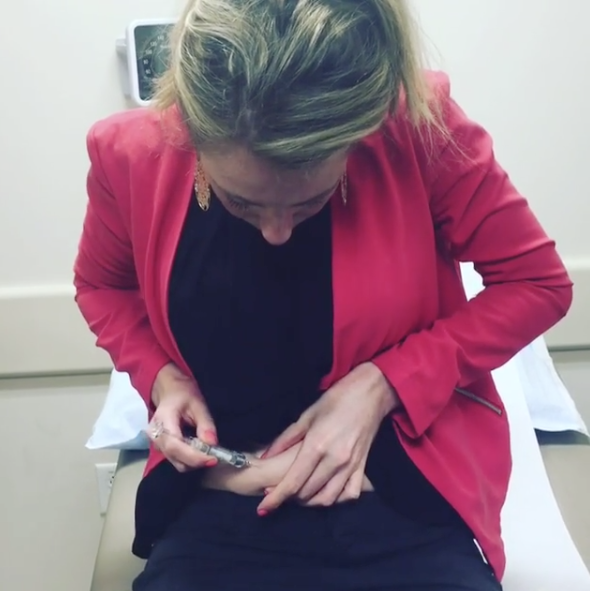
Aaron Jun: What got you over this fear? How'd you get over it? Was it just this like frustration? Where you got sick of it-
Lilly Stairs: I think that that really brought me to the tipping point. I'll tell you. And it was a bad fear, like when I was ten, too old - this is embarrassing.
So, I would go in to get my flu shot, and actually... my younger brother went first. And they were all ready to give me the shot, and I jumped off the table and ran out the door, like of the pediatrician's office.
And I wasn't like two, three, four, five, I was probably like ten.
Aaron Jun: Right.
Lilly Stairs: It was inappropriate. So that's how bad my fear was. But when you are being poked and prodded all the time as a chronic illness patient, it was dealing with this frustration. I was like:
"You know what, I can do this. I can absolutely do it."
Got a little extra chub in the stomach area so it makes it a little easier. You should always inject where you've got a little extra fat to you know, makes it a little more comfortable.
Aaron Jun: I didn't know that. I had no idea.
Lilly Stairs: So, it doesn't hurt as much. It's a real tip. I'm telling you.
Aaron Jun: I thought you were just bringing that up out of thin air.
Lilly Stairs: No. It's a real-
Aaron Jun: And I wasn't sure how to get the conversation back-
Lilly Stairs: It's legitimate. It's legitimate.
Aaron Jun: Okay. So that's frustration one.
Lilly Stairs: Okay so that's frustration one, yes, yeah.
Aaron Jun: And how many frustrations are there here?
Lilly Stairs: In what?
Aaron Jun: I mean, how many did you talk about during your keynote?
Lilly Stairs: Oh, we talked about a lot of different ones. So, another one we talked about was this frustration that patients experience when their doctors won't coordinate care across specialties.
So, if you have to deal with a gastro, rheumo, derm, primary care, many patients told me that their doctors refused to either coordinate care internally within their own hospital system. Or coordinate externally.
So maybe they saw a derm at one hospital, but then saw a rheum at another hospital, and they wouldn't coordinate care.
Aaron Jun: Why wouldn't they coordinate that care?
Lilly Stairs: Unclear. I mean there was no real answer and I do think it's partly because there are some administrative burdens on the physician side, right?
Aaron Jun: Right. Yeah.
Lilly Stairs: But ultimately, that burden is being passed off to the patient. Because the patient is then responsible for having to coordinate and communicate back and forth between all the physicians.

Lilly Stairs: So we talked a little bit about that as well. Those are some of the key frustrations.
Lilly Stairs: We also talked about the fact that 75 percent of people living with autoimmune diseases are women. We talked about how women are often forced to prove their pain much more than men are.
Aaron Jun: Right, yeah, you hear this all the time. Like, it's probably in your head. "Are you sure?"
And what is it, like, a perceived lower threshold of pain?
Lilly Stairs: It's disgusting and I think we're gonna have to do a whole nother series of podcasts on this. We can't even get into that right now. But that's another thing we touched on. And I talked about it in the context of shared decision making.
Aaron Jun: Right.
Lilly Stairs: So, one thing that's really important is that shared decision making is such a big buzzword. It's been a buzzword for probably the past five or so years. We're hearing everybody saying, "Oh yeah, it's important to do shared decision making". I don't know that this is really being fully implemented at this point.
I think that it's nice to say, but I'm not sure it's actually happening.
And a part of the problem is that societal constructs have taught us that the physician is in this position of power, and the patient should just listen.
Aaron Jun: Right.
Lilly Stairs: And there was actually a study done out in this area, in the bay area, with a pretty wealthy, well educated group of individuals who said they were actively interested in engaging in shared decision making with their doctor.
But when push came to shove, and they were in their appointment, they couldn't bring themselves to challenge their doctor.
Aaron Jun: Oh it's a completely different dynamic. Right?
Lilly Stairs: Yeah.
Aaron Jun: Especially, again, like coming from someone who hasn't had to go to the doctor all that often, I never felt comfortable asking a question. And I would, you know, muster up my courage to ask like one question. Like, "Hey doc, I feel like something's a little off".
Lilly Stairs: And that's just a question, not even pushing back.
Aaron Jun: Right.
Aaron Jun: And there's no diagnosis, it's just, "Hey, I think this might be happening".
And you know, for various reasons - and it's not like the doctor has any malicious intent - but it's always, "oh it's probably blah blah blah", or, "oh it's nothing", or "oh if it gets bad in a month come back."

Aaron Jun: And then you just kind of saunter away. And you're like, well, I guess I'll try to remember if it feels bad in a month. And then you just kinda don't keep logs or anything, and then a month later you're like, "Well, I guess I don't know, so maybe she was right."
Lilly Stairs: And something that chronic illness patients are facing on a regular basis is that it can be uncomfortable to be in this position of trying to engage in shared decision making. And pushing back against your doctor.
And so, some of the things that I talked about were that doctors do want to engage in shared decision making, but need to make sure that they're communicating the right body language, and using the right language.
And saying,
"it's totally fine for you, this is your decision, it's your body, it's your choice, you can seek a second opinion."
Taking all these doctors into consideration is really important. So that's another thing we talked about. We covered a lot.
Aaron Jun: Yeah. Of course.
Lilly Stairs: And as we're chatting here, I wanna take some time to actually apply some of what I discussed in this keynote to the work that we're doing at Clara, and talk a little bit about how this is impacting the patients that we're working with at Clara.
Aaron Jun: Right. I mean, we've worked with what now, thousands of patients. And we've connected them to hundreds of trials. And this is the common thread in all their narratives.
It's unbelievable to me - well it's believable now - in the beginning I certainly had that moment of like, "well, are you keeping good notes? Are you actually doing everything you possibly can? 'Cause you seem just completely lost out there."
But so many of the patients who come in are just overwhelmed, they don't know what their choices are. No one's told them what their choices are. And it's not just the dynamic between a patient and a doctor. It's between and health insurance provider, if there is one in play.
Lilly Stairs: Mm-hmm.
Aaron Jun: Trying to get that covered. Going to the doctor and trying to figure out which medications might be covered. Not knowing in that moment of questioning, like, whether or not your insurance will cover something.
Lilly Stairs: Well, that's just phase one. And then you look at when patients actually want to consider a trial, or a patient or caregiver wants to consider a clinical trial. Okay, now what do the steps look like?
It's this huge administrative burden every step of the way to start from search to enrollment, into that trial.
Aaron Jun: I mean, how long does it take for someone right now to reply to one of our emails? From the clinical trial side.
Lilly Stairs: Oh God. I mean for those of you who aren't watching on this lovely YouTube video, I'm rolling my eyes.

Lilly Stairs: So, it is disgusting how long it sometimes takes for people to get back to us. We will reach out to a study coordinator or to a facility on behalf of a patient, I think that there was one time where it took almost a month.
Aaron Jun: Yeah. Right.
Lilly Stairs: That's not an exaggeration. It was a legitimate month.
Aaron Jun: And the heartbreaking thing is in this case, the patient would come back to us and say, "Hey, everything's cool." I haven't heard back from them but like, "thanks so much for the work that you've done."
And we're just - you can't help but sit there and feel absolutely helpless and heartbroken in that moment, for this person who's just trying to access, not even treatment, but like, just someone in that facility to ask a couple of questions and say, "Hey, do I qualify?"
Lilly Stairs: Well, and it's not even, "Do I qualify?". First it's getting a response. And then once you get a response. Now you're asked to send over all your medical records from before you were even born.
Aaron Jun: Right.
Lilly Stairs: And it's "how do I coordinate all that? How do I get all my different hospitals and facilities to send all that information?" And understanding all the different pieces that go into a clinical trial and "is my travel going to be reimbursed? And how many times do I need to go in for an appointment?"
And so, there are far too many administrative burdens on the patient when it comes to clinical trials. It's really bad for patients just in general. And we're looking at from a general care perspective that administrative burden is large. And then you take it to the clinical trials level and it's-
Aaron Jun: Well, it's anytime you need to get specialized. Right? That's what it sounds like.
Lilly Stairs: Yeah. That's a great point.
Aaron Jun: Anytime you have to go see a rheumatologist or a clinical trial site, the difficulty level just spikes on you. And you might not be ready for it, and I imagine the folks we've helped, again, like thousands of people, those are the people who stuck it out long enough to find us. Right?
Lilly Stairs: Right. Right. Right. Right.
Aaron Jun: So, how many people just gave up and said, "Well I guess this is my life." And that doesn't have to be the case.
Lilly Stairs: And we know and not to...we're such, like biased clinical trial champions here at this point. But what are you gonna do?
Aaron Jun: A little bit.
Lilly Stairs: That's our job.
Aaron Jun: We're extremists.
Lilly Stairs: Oh, we're extremists, but truly, if we do not have patients in clinical trials, if we do not have these amazing people who are volunteering themselves to be in trials, we do not have treatments.
I sit on a couch but I'm lying down, and I don't talk because I don't have my medicine. And it was all of those patients who participated in the trial that got this treatment to market that I sit here today.
And there are just so many clinical trials currently trying to recruit, and they're unable to fill them because they don't have the patients. And they don't have the patients for a lot of different reasons, but God, I think the administrative burden that's being placed on patients in this situation, is a huge factor.
Aaron Jun: It's absolutely overwhelming. And I do think - to be fair to the researchers - as in any field, you're going to get people who just don't perform particularly well.
I do think most people here want to do the best they can. They just don't have the tools that they need to help them.
Lilly Stairs: The tools, the time, the resources, I think we all know. And that's like what I was saying at the beginning when we talk about physicians also having an administrative burden.
Everybody in this industry, in health care, is pressed for time. We're racing against the clock for treatments and cures and there are so many people who need it.

Lilly Stairs: And when you look at the way the system is structured, it forces everybody to be in a time crunch, and it forces these burdens to be placed on people like the patient. And so, anything we can do to make a difference is important on our end.
Aaron Jun: Yeah. And I think we're doin' that here at Clara hopefully. And I know that there are a bunch of other companies out there trying their darn best to make tomorrow a little less strenuous on both patients, researchers - all of these guys, doctors, physicians, nurses.
And I hope one of these days our kids will one day wake up and maybe one of these hurdles are gone.
Lilly Stairs: Maybe just one. Start with one.
Aaron Jun: Just one would be fantastic.
Lilly Stairs: And so, I think that that's a good note to sort of wrap up on here. There's a lot of work to be done.
Aaron Jun: Yes.
Lilly Stairs: We're aware of the work that needs to be done, and we're gonna keep fighting for that and we encourage you to come to us. Share your stories. We always wanna keep learning from patients, from researchers, from physicians.
We want to hear what your experience has been so that we can incorporate that into the work that we are doing here.
Aaron Jun: And I think we're gonna have a lot of stuff coming out in the near future. And for now, we'll just keep up the good fight.
Lilly Stairs: Cheers to that.
Aaron Jun: Cheers to that.
